Woman Asks Her Roommate To Pay Vet Bills For Her Injured Dog Because She Left It Unattended With A Stranger Dog
Most family dogs are loving and friendly. However, we must remember that every animal — no matter how docile — has the potential to be dangerous, especially when they feel threatened.
In the event of a dog attack, who should be held responsible? When determining such liabilities, you can always refer to the laws set by your country.
In the U.S., dog bite laws may vary. Generally, the victim has the right to be compensated in most states for all dog bites, even if the canine has never displayed aggressive behavior before.
The statistics shared by the Centers for Disease Control and Prevention (CDC) reveal that approximately 4.5 million people in the United States are bitten by canines each year. While most cases are minor, about 885,000 of them will require medical attention.
Some will force the victim to miss work, while others will cause pain or disfigurement. Children account for half of all bites requiring medical attention.
The law is quite clear in these situations. That's why one Redditor believes that she should not pay for the vet bills incurred by her roommate when her dog was attacked by another dog owned by her roommate's boyfriend.
However, since she's still uncertain about her decision not to pay, she asked for opinions on the "Am I The A**hole" (AITA) subreddit.
According to the original poster (OP), she asked her roommate to take care of her dog, to which the roommate agreed.
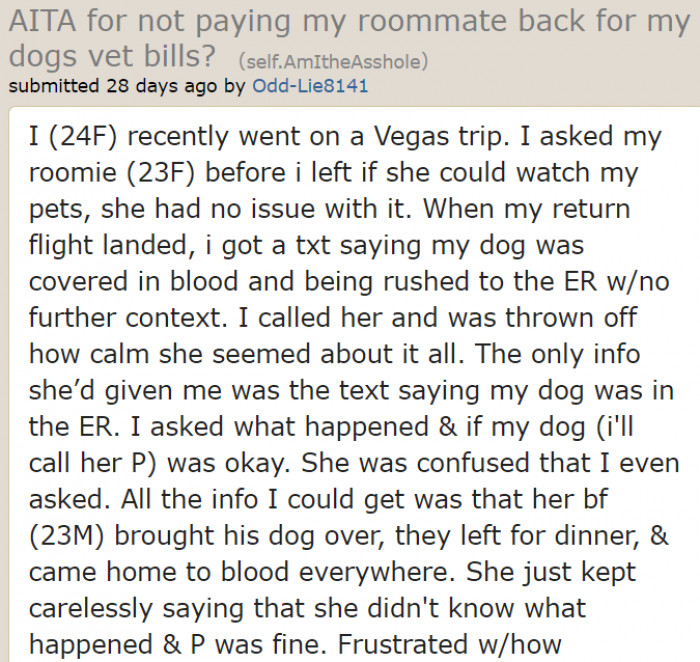
But something bad happened.
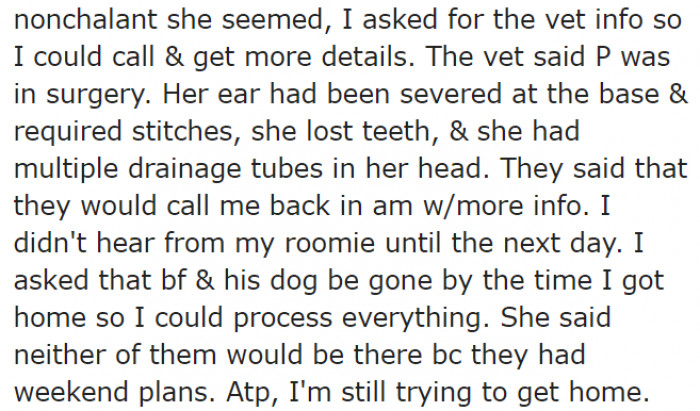
The OP's roommate and the roommate's boyfriend insist that they're not at fault.
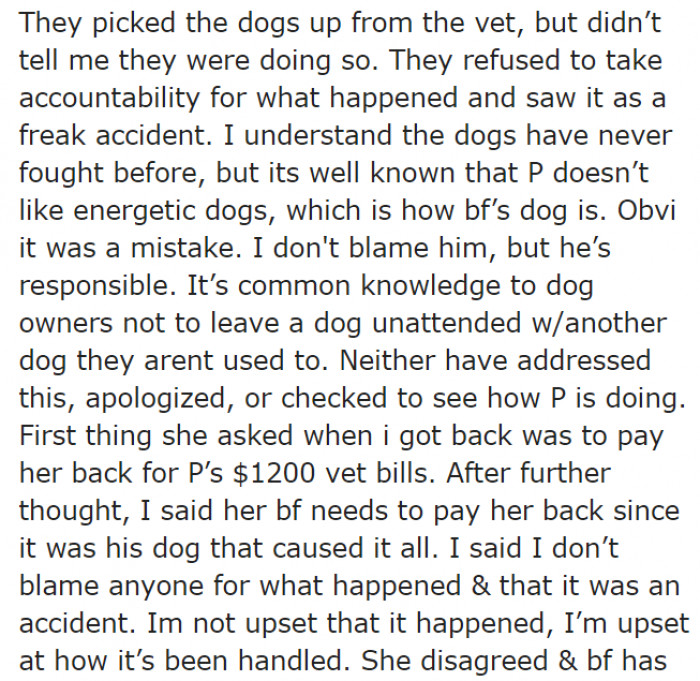
The Impact of Uncertainty on Conflict
In situations like the one presented, uncertainty can heighten emotional responses and lead to conflict. Research in social psychology indicates that ambiguity often exacerbates feelings of anxiety and defensiveness, which can manifest in disputes over responsibility and compensation (Pettigrew, 1997). When an unexpected event occurs, such as an injury to a pet, individuals often rush to assign blame as a coping mechanism to manage their feelings of distress and vulnerability.
Dr. John Gottman, a prominent relationship researcher, emphasizes that when people feel threatened, their ability to communicate effectively diminishes. This can lead to a breakdown in dialogue and understanding, further complicating the resolution process. Understanding the role of uncertainty can help individuals frame their discussions more constructively, focusing on clarity and empathy rather than blame.
It's common sense not to leave dogs who are strangers to one another unattended.
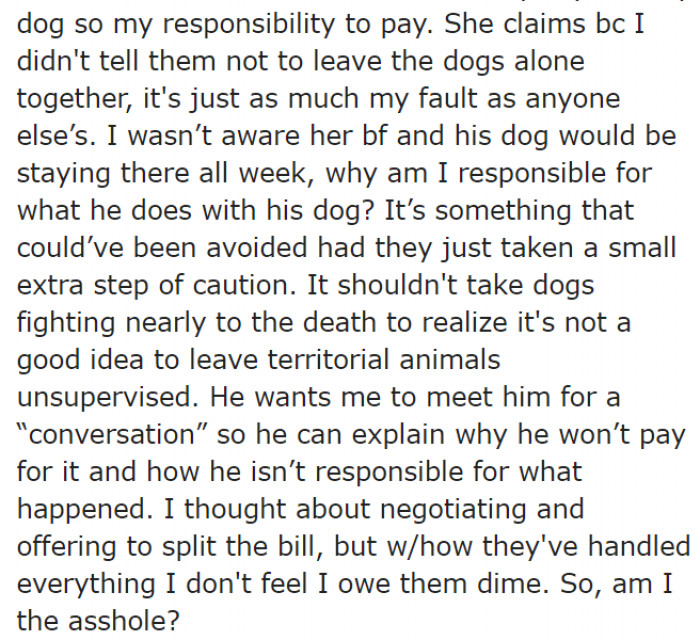
The consensus of Redditors: Don't pay a cent.

That's not what a real friend would do.
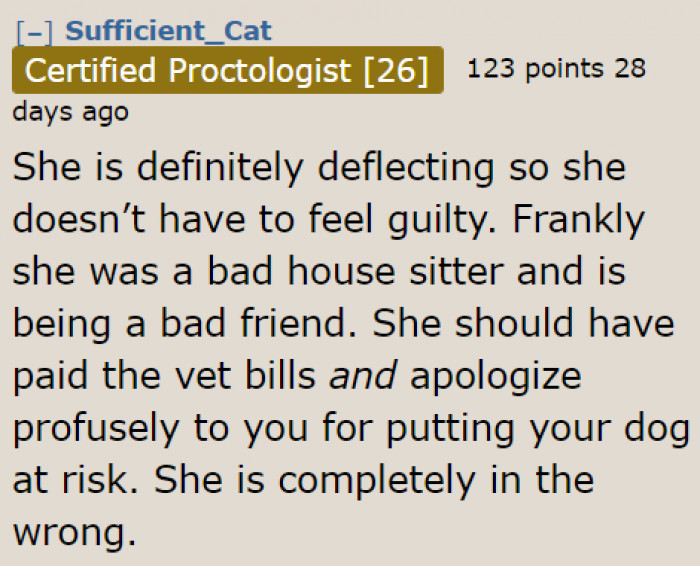
Behavioral economics suggests that fairness and equity play crucial roles in decision-making processes, especially in shared living situations. According to research conducted by the University of California, Berkeley, people are more likely to perceive situations as fair when there is clear communication and mutual understanding of responsibilities (Fehr & Schmidt, 1999). In the case of the dog owner and her roommate, the lack of prior communication about the presence of the other dog could lead to feelings of resentment and unfairness.
To mitigate these feelings, it's essential for roommates to establish clear guidelines regarding pet interactions and responsibilities. This could involve creating a shared document outlining pet care rules and expectations, which can help ensure everyone is on the same page and reduce potential conflicts.
The OP doesn't need to keep such a bad friend.

You can't help but feel betrayed if the same situation happens to you.
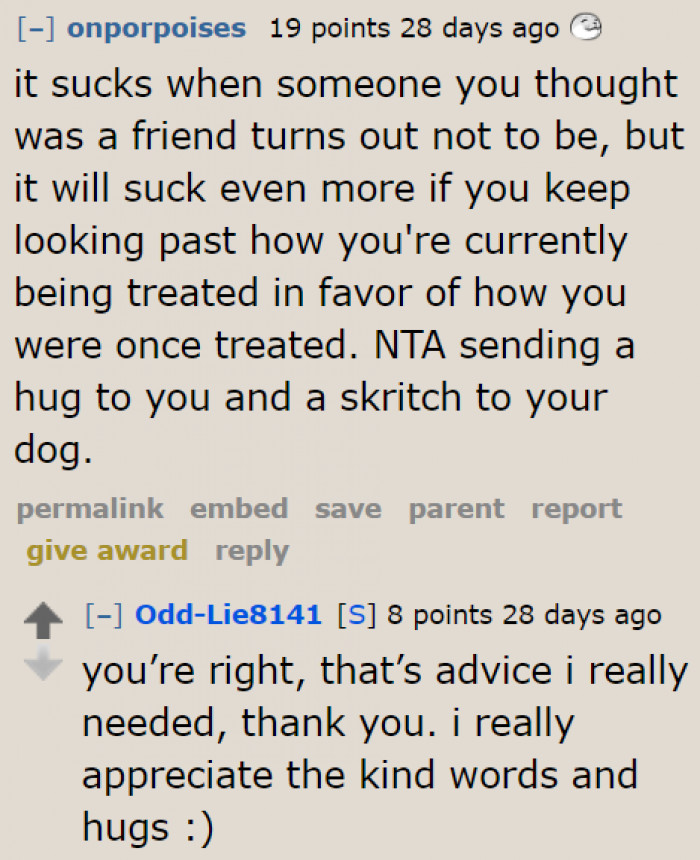
If the roommate had informed the OP, she could have reminded them to take extra precautions.
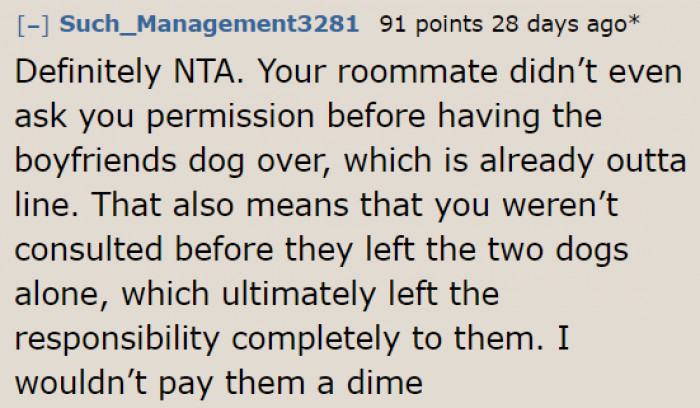
The Role of Empathy in Conflict Resolution
Empathy is a powerful tool in navigating interpersonal conflicts, especially in emotionally charged situations like a pet injury. Research by Dr. Simon Baron-Cohen indicates that empathy can significantly influence how we interpret and respond to the actions of others (Baron-Cohen, 2005). When individuals can see a situation from another's perspective, they are more likely to engage in cooperative problem-solving rather than adversarial blame-shifting.
Practicing active listening techniques, such as reflecting on what the other person has said and validating their feelings, can enhance empathetic connections. Engaging in structured conversations where each party has an opportunity to express their feelings and perspectives can lead to more amicable resolutions and reduce the likelihood of future conflicts.
While the realistic approach is to press charges, the OP doesn't want the situation to reach that point.
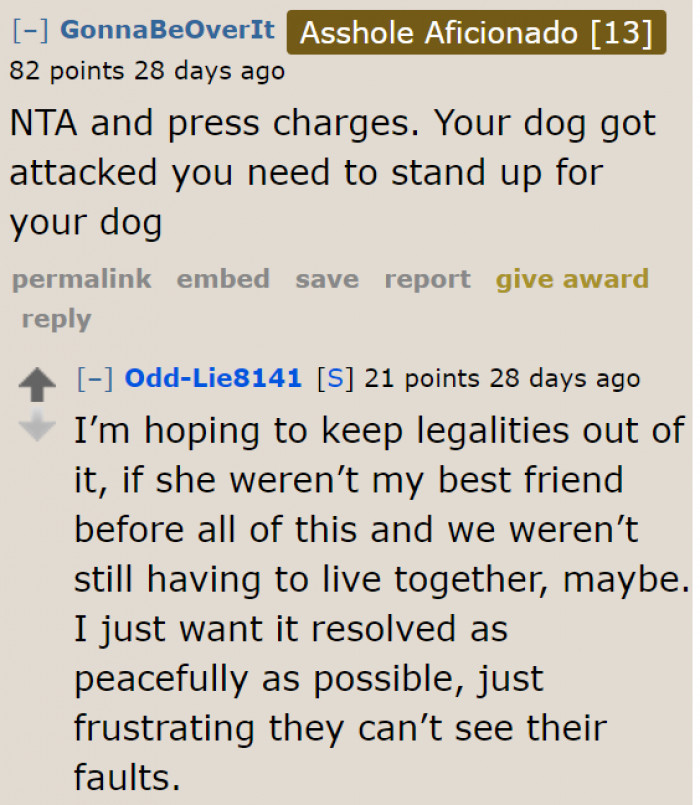
She feels gaslit.
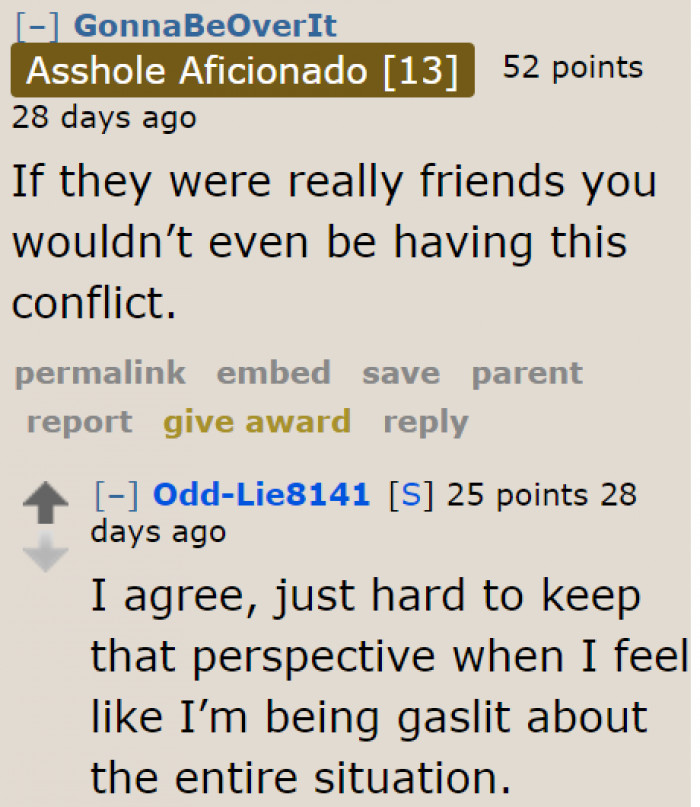
This could be a possibility.
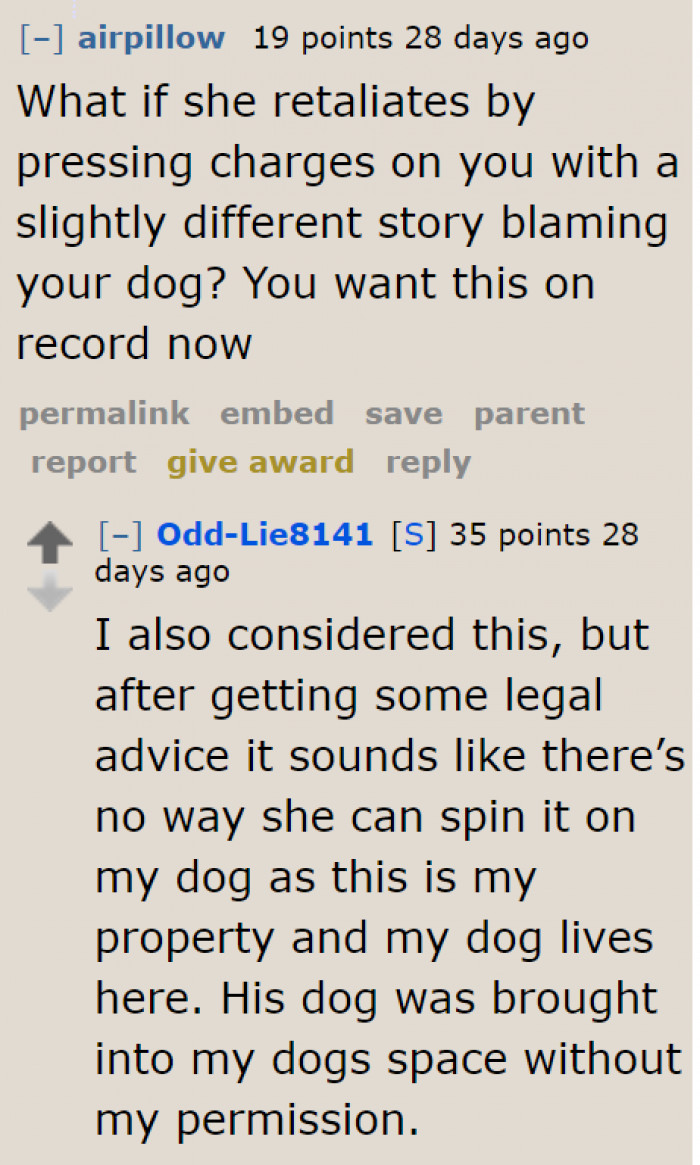
Understanding the psychological underpinnings of pet ownership can also shed light on the emotional stakes involved in this situation. According to a study in the Journal of Social Issues, pets often serve as significant emotional support and attachment figures for their owners (Walsh, 2009). This bond can intensify feelings of panic and anger when a pet is harmed or put in jeopardy, particularly in unexpected circumstances.
This attachment means that the dog owner's reaction might not solely stem from the financial aspect of the vet bills but also from a deeper emotional connection to her pet. Recognizing this can help roommates approach the situation with more sensitivity and compassion, ultimately leading to a more constructive dialogue.
We hope so too!

In the first place, the boyfriend and his dog are the outsiders.
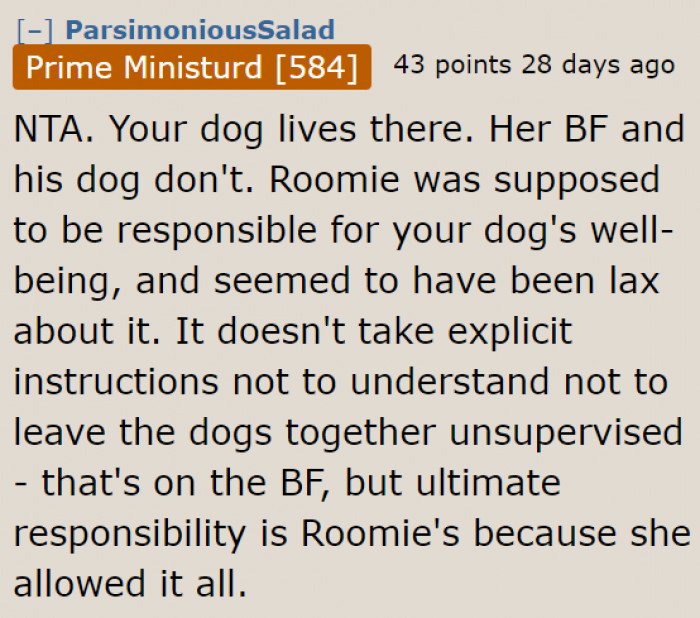
They're not owning up to their mistake.
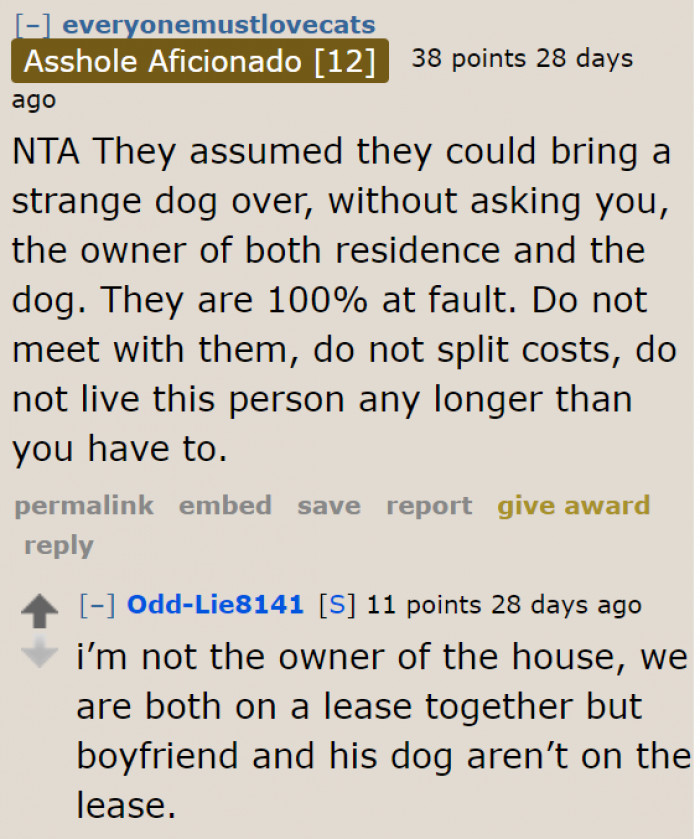
Revisiting Responsibility in Shared Spaces
Shared living situations often bring about complex dynamics regarding responsibility and accountability. Research indicates that people in communal living arrangements may experience what's termed 'diffusion of responsibility,' where individuals feel less personal accountability for outcomes (Latané & Darley, 1970). In this context, the roommate may not perceive the full impact of leaving her boyfriend's dog unattended, leading to a potential conflict over the vet bills.
To counteract this tendency, it's beneficial to establish clear roles and responsibilities upfront. Creating a shared responsibility chart or having regular meetings to discuss pet care can help ensure all parties are aware of their obligations and the potential consequences of their actions, promoting a more harmonious living environment.
All they needed to do was inform the dog owner.
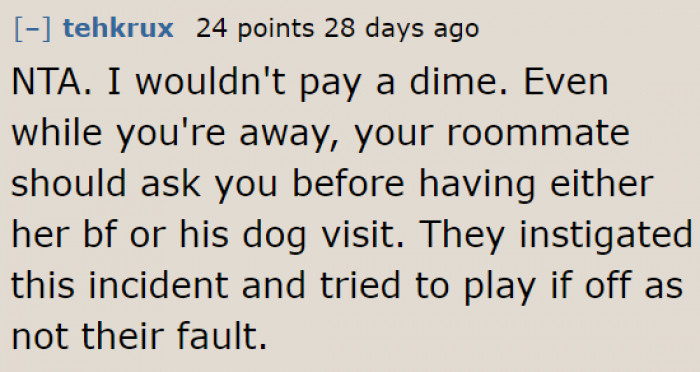
The boyfriend is the one who caused this.

A Redditor impressed by the OP's kindness.

Conflict resolution strategies can be particularly effective in situations involving emotional investments, such as pet ownership. A study published in the Conflict Resolution Quarterly highlights that collaborative negotiation approaches, where all parties work together to find a mutually agreeable solution, tend to yield better outcomes than competitive tactics (Fisher & Ury, 1981). In this case, both the dog owner and the roommate could benefit from engaging in a collaborative discussion about the incident.
By expressing their feelings and needs openly, they can work towards a solution that acknowledges the emotional weight of the situation while also addressing practical concerns, such as financial responsibilities.
The roommate may be an adult, but it looks like she needs to be reminded of what "responsibility" means.
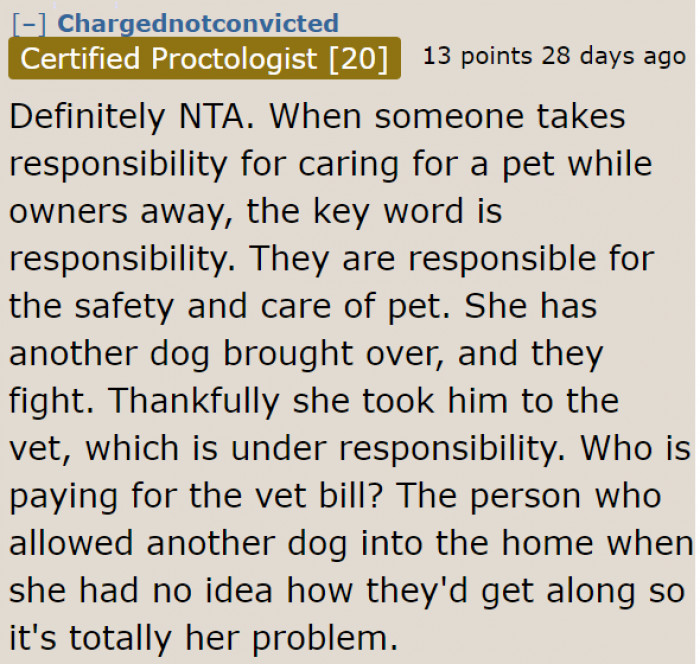
The roommate and the boyfriend can always split the bill. The bottom line is that they should pay for it.
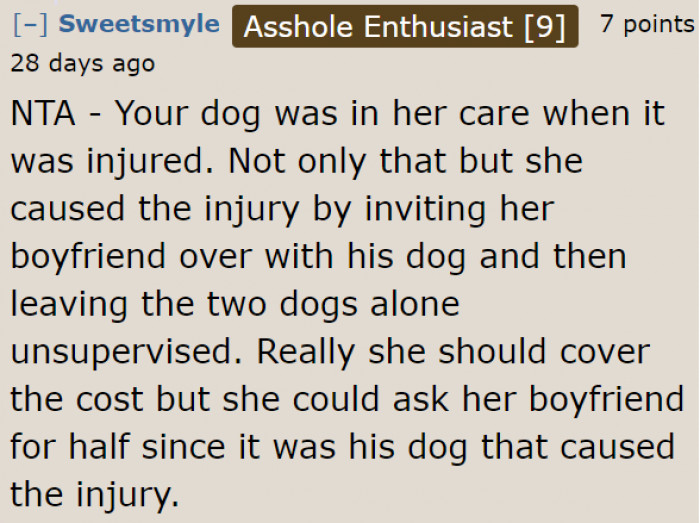
It was never a freak accident. It was caused by irresponsibility.
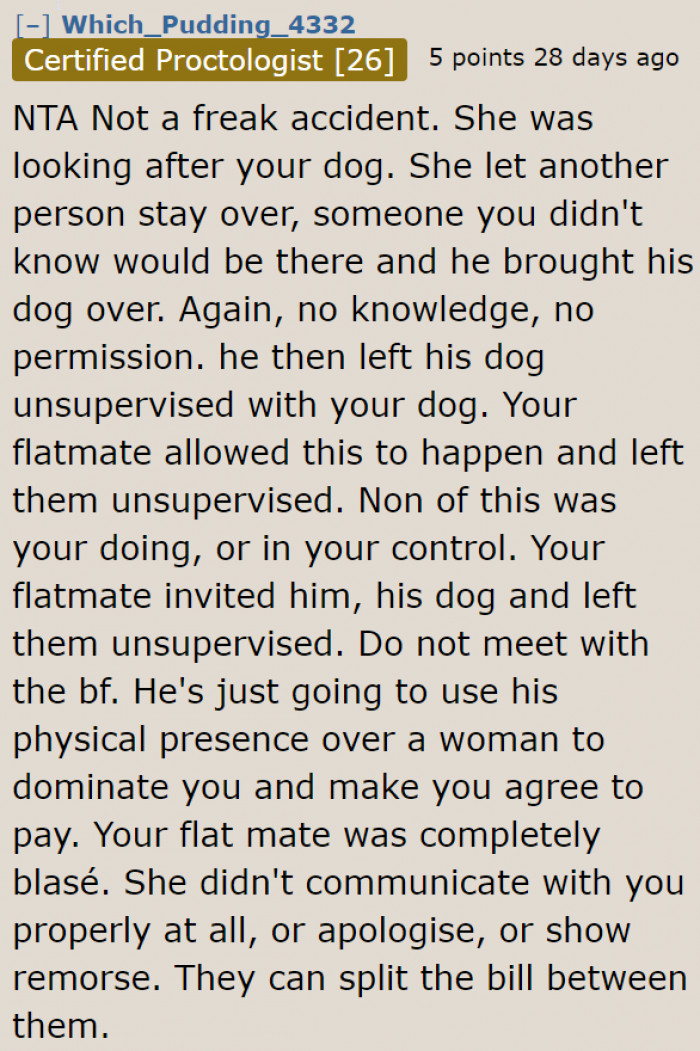
Creating an Environment for Open Communication
Effective communication is key in preventing misunderstandings and conflicts in shared living situations. Studies show that open lines of communication can significantly enhance relationship satisfaction and decrease the likelihood of disputes (Markman et al., 2001). When both parties feel safe to express their thoughts and concerns without fear of judgment, it fosters a collaborative atmosphere that can lead to healthier interactions.
To cultivate such an environment, roommates should prioritize regular check-ins to discuss any potential issues, including pet-related concerns. Setting aside time for these discussions can help establish trust and ensure that all roommates are comfortable addressing difficult topics as they arise.
This wouldn't have happened if the guy had taken some preventative measures.
He never should have left the dogs unattended since there's always a possibility that canines can become aggressive when another dog is around. They can always turn to the law to see who's really at fault here.
And with a friend like that, it's time for the OP to reconsider the friendship and move out once the lease is over.
Psychological Analysis
This situation highlights how unresolved communication issues can lead to significant conflict, especially when emotions run high. The dog owner's attachment to her pet likely amplifies her feelings of panic and anger, making it harder for her to approach the roommate with empathy. Establishing clear communication and shared responsibilities upfront could help prevent such misunderstandings and foster a more collaborative living environment.
Analysis generated by AI
Analysis & Alternative Approaches
Research from the National Institute of Mental Health highlights that effective communication and emotional regulation strategies can significantly improve relationship dynamics, particularly in shared living arrangements. Studies indicate that fostering an environment of empathy, understanding, and open dialogue not only enhances conflict resolution but also contributes to long-term relational stability. The key insight is that when individuals prioritize clarity and emotional intelligence in their interactions, they are more likely to navigate conflicts successfully and maintain healthier relationships over time.



